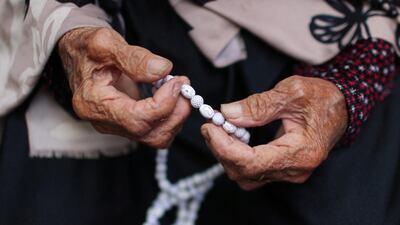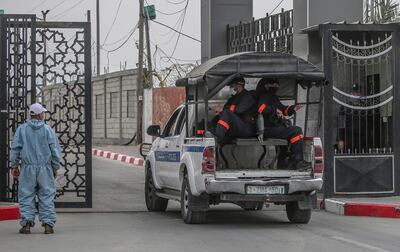Time ticks by slowly as Islam Alkhaldi clutches her phone, waiting at her mother’s dining room table for the maghrib prayer.
Usually, this table would be full as the day’s fast ends, but this year, Ramadan is markedly different. As for so many Muslims around the world, the spread of coronavirus and measures taken to combat it are keeping families apart.
Islam’s mother Nima Alkhaldi, 64, arrived in Gaza last week after spending three months in Jordan for medical treatment. Upon her return, she was sent directly to a quarantine centre for 21 days.
Instead of a shared meal, Islam, her father, son and daughter share a video call with Nima. Nima’s grandchildren wave to the camera and the family talks about their days, punctuated by questions from the children about when their grandmother will be coming back.
Gaza confirmed its first two cases of the virus on March 22, more than three months after the first case was reported in Wuhan, China.
On March 15, the government of Gaza began quarantining all travellers coming in through the Rafah border in the south and the Erez crossing in the north. As May approached, it was clear some would be spending Ramadan apart from their families.
"This Ramadan is different. I am spending it alone and it is really hard," Nima told The National.
She is staying with two other women in a room in Al Matahaf hotel in the west of Gaza city, and will spend the rest of Ramadan and Eid in quarantine.
"Ramadan means gathering with families and praying taraweeh. This Ramadan I lost all of this, because of coronavirus,” Nima said.
Without her, Nima’s family said Ramadan has lost its shine.
"Ramadan lost its happiness and joy," said Islam, 23.
"We are speaking with my mother every day at iftar and suhoor time, to let her feel as if she is with us.”
Dr Jadoo Abu Shariaa, a gastroenterologist helping coronavirus patients, is also feeling the strain. He has to stay in quarantine to protect his family.
"It is really hard to spend Ramadan alone without your family," he told The National.
This is the second time Dr Abu Shariaa, 46, has lived apart from his family during the holy month to help patients. The first was in Ramadan 2014, during the war in Gaza, which lasted for 51 days. He was working in Abu Yossif Al Najar hospital in the southern city of Rafah.
"This situation brings back to me the memories of the last war on Gaza, which really affects me negatively," Dr Abu Shariaa said from the Blue Beach Hotel.
"This isolation negatively affects the people who are accommodated here, and really this situation is more difficult than the situation of the war, because you are dealing with an invisible enemy."
The Rafah border with Egypt was opened on Tuesday for three days to allow Gazans to return. Travellers were sent to compulsory quarantine centres set up in hospitals and clinics, hotels and schools, Gaza’s Health Ministry said.
The enclave has 14 confirmed cases, but hundreds more are suspected. On April 9, health ministry spokesman Ashraf Al Qidra said Gaza had run out of tests. The ministry is run by the enclave's rulers, Hamas.
As testing capacity fails to grow and a vaccine looks far off, quarantine is the best chance of halting the spread of the disease. But it is not easy, Dr Abu Shariaa said: "I manage to steal only minutes to contact my family and talk with my children to give them support and try to compensate for my absence."












